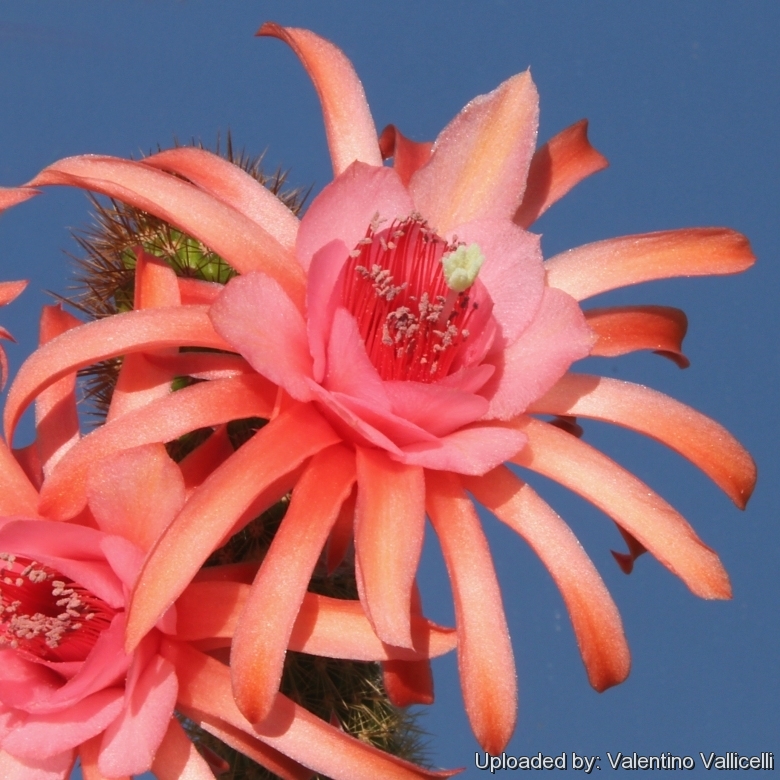
Cleistocactus cv. Andenken An Friedrich Ritter Photo by: Valentino Vallicelli
Origin and Habitat: Garden origin (Nursery produced cultivar)
Synonyms:
Description: Cleistocactus cv. Andenken An Friedrich RitterSN|3784]]SN|17828]] (best known as Hildewintera cv. Andenken An Friedrich RitterSN|17829]]SN|17829]]) is a cute little prolific clumping cactus with arching, pendant, or trailing stems that can grow up to 1 m long and 2,5-4 cm wide with many branches. It is an hybrid plant involving Cleistocactus winteriSN|17828]]SN|3784]] (the Golden Rat Tail) and an unknown Echinopsis sp. It produces a profusion of beautiful medium sized pink flowers at a time, and is quite a sight. Magnificent bloomers, the flowers can endure for two-three days (depending on temperature and sun exposure).
Flowers: Medium sized, short-tubed.
Inner tepals: Pink.
Outer tepals: Thin almost linear, reflexed, salmon-pink with orange midribs.
Filaments: Reddish.
Anthers: Cream-violet.
Style: Pink.
Stigma lobes: Greenish-white.
Subspecies, varieties, forms and cultivars of plants belonging to the Cleistocactus hybrid (Hildewintera) group
Notes: HILDEWINTERA HYBRIDS: Hildewimtera aureispina (now renamed Cleistocactus winteriSN|3784]]SN|3784]]i) is an old species that can be hybridized with various cactus of several different genus (Among them: {{Echinopsis, Lobivia, Matucana}}, etc) giving rise to some intergeneric hybrids.
Hildewintera hybrid develops really amazing flowers of different colours on the original pendulous "hildewintera" body and many of these hybrids have cultivar names. This plants form soon spectacular clumps with several flowers at a time and are quite a sight.
Remarks: They are often thicker, stronger, larger growing than H. aureispina and tend not to have the typical thin stemmed offsets. The offsets produced are more strongly attached to the main stems.
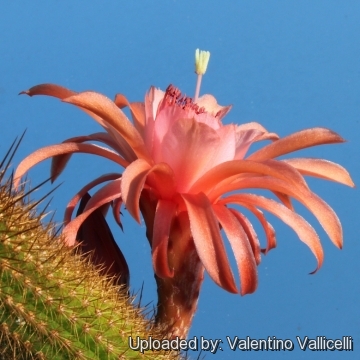 Cleistocactus cv. Andenken An Friedrich Ritter Photo by: Valentino Vallicelli
Cleistocactus cv. Andenken An Friedrich Ritter Photo by: Valentino Vallicelli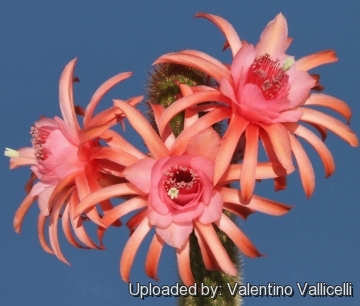 Cleistocactus cv. Andenken An Friedrich Ritter Photo by: Valentino Vallicelli
Cleistocactus cv. Andenken An Friedrich Ritter Photo by: Valentino Vallicelli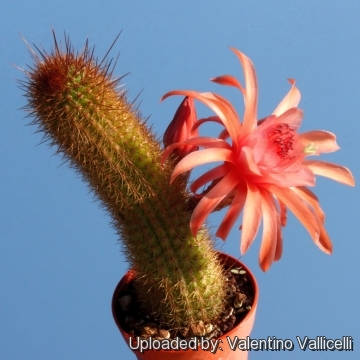 Cleistocactus cv. Andenken An Friedrich Ritter Photo by: Valentino Vallicelli
Cleistocactus cv. Andenken An Friedrich Ritter Photo by: Valentino Vallicelli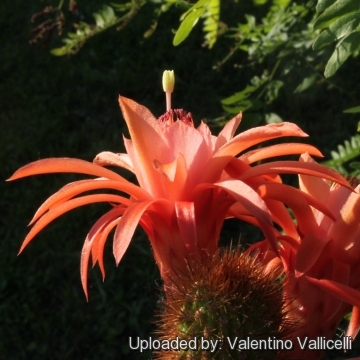 Cleistocactus cv. Andenken An Friedrich Ritter Photo by: Valentino Vallicelli
Cleistocactus cv. Andenken An Friedrich Ritter Photo by: Valentino Vallicelli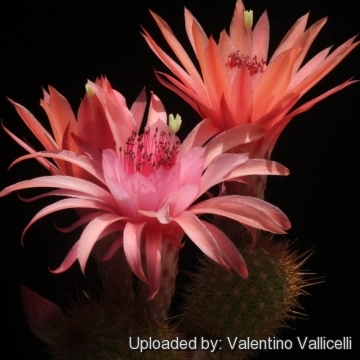 Cleistocactus cv. Andenken An Friedrich Ritter Photo by: Valentino Vallicelli
Cleistocactus cv. Andenken An Friedrich Ritter Photo by: Valentino Vallicelli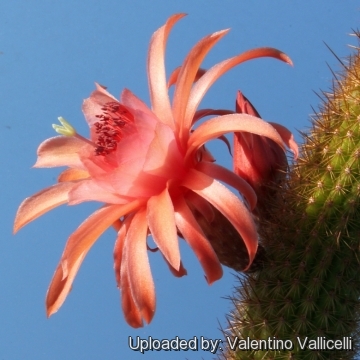 Cleistocactus cv. Andenken An Friedrich Ritter Photo by: Valentino Vallicelli
Cleistocactus cv. Andenken An Friedrich Ritter Photo by: Valentino Vallicelli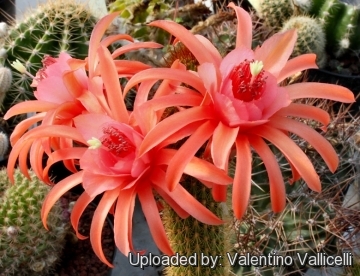 Cleistocactus cv. Andenken An Friedrich Ritter Photo by: Valentino Vallicelli
Cleistocactus cv. Andenken An Friedrich Ritter Photo by: Valentino Vallicelli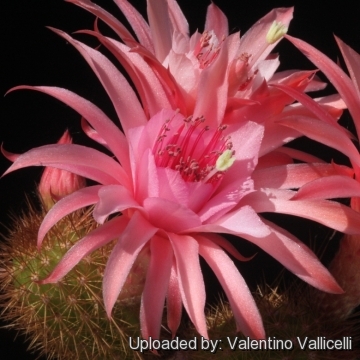 Cleistocactus cv. Andenken An Friedrich Ritter Photo by: Valentino Vallicelli
Cleistocactus cv. Andenken An Friedrich Ritter Photo by: Valentino VallicelliCultivation and Propagation: These plants are summer growers species that offer no cultivation difficulties. Grow them in rich, airy, porous, growing medium which mainly consists of non organic material such us clay, pumice, lava grit, and only a little peat or leaf-mould. If potted, repot preferably in the spring, if their roots become cramped. Generally, they should be repotted every other year in order to provide fresh soil. However, this doesn't necessarily mean they'll need larger containers. Fill about a quarter of the pot with broken crocks, gravel, etc. to promote good drainage. After repotting, do not water for a week or more. Water regularly in summer (but do not overwater), and let their soil dry out between waterings, keep rather dry in winter. No water should ever be allowed to stand around the roots. Feed with a high potassium fertilizer in summer.
Exposure: Outside they need a bright exposure, full sun or half shade in summer if the location is exceedingly hot or bright, inside needs bright light, and some direct sun. It can tolerate moderate shade, and a plant that has been growing in shade should be slowly hardened off before placing it in full sun as the plant will be severely scorched if moved too suddenly from shade into sun.
Frost Tolerance: Light frost protection required for safe cultivation, but many of the hybrids are relatively frost resistant if kept dry (Down to -5°C or less depending on clone). This plants need a period of cool rest in winter to produce flowers abundantly. They flower freely indoors if conditions suit them.
Watch for infestations of mealybug, scale insects and spider mite.
Propagation: Easy to propagate from cuttings. The Hildewintera clones branches profusely and can be reproduced exclusively by cuttings. The cuttings will take root in a minimum temperature of 20° C. Cuttings of healthy shoots can be taken in the spring and summer, Cut them with a sharp, sterile knife, leave the cutting in a warm, dry place for a week or weeks (depending on how thick the cutting is) until a callus forms over the wound. Once the callus forms, the cutting may be inserted in a container filled with firmed cactus potting mix topped with a surface layer of coarse grit. They should be placed in the coarse grit only; this prevents the cut end from becoming too wet and allows the roots to penetrate the rich compost underneath, they root easily with no further assistance. Just let them lay on the soil and you have a new start. The cuttings should root in 2 to 6 weeks.
Your Photos
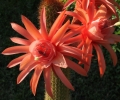
by Valentino Vallicelli




















